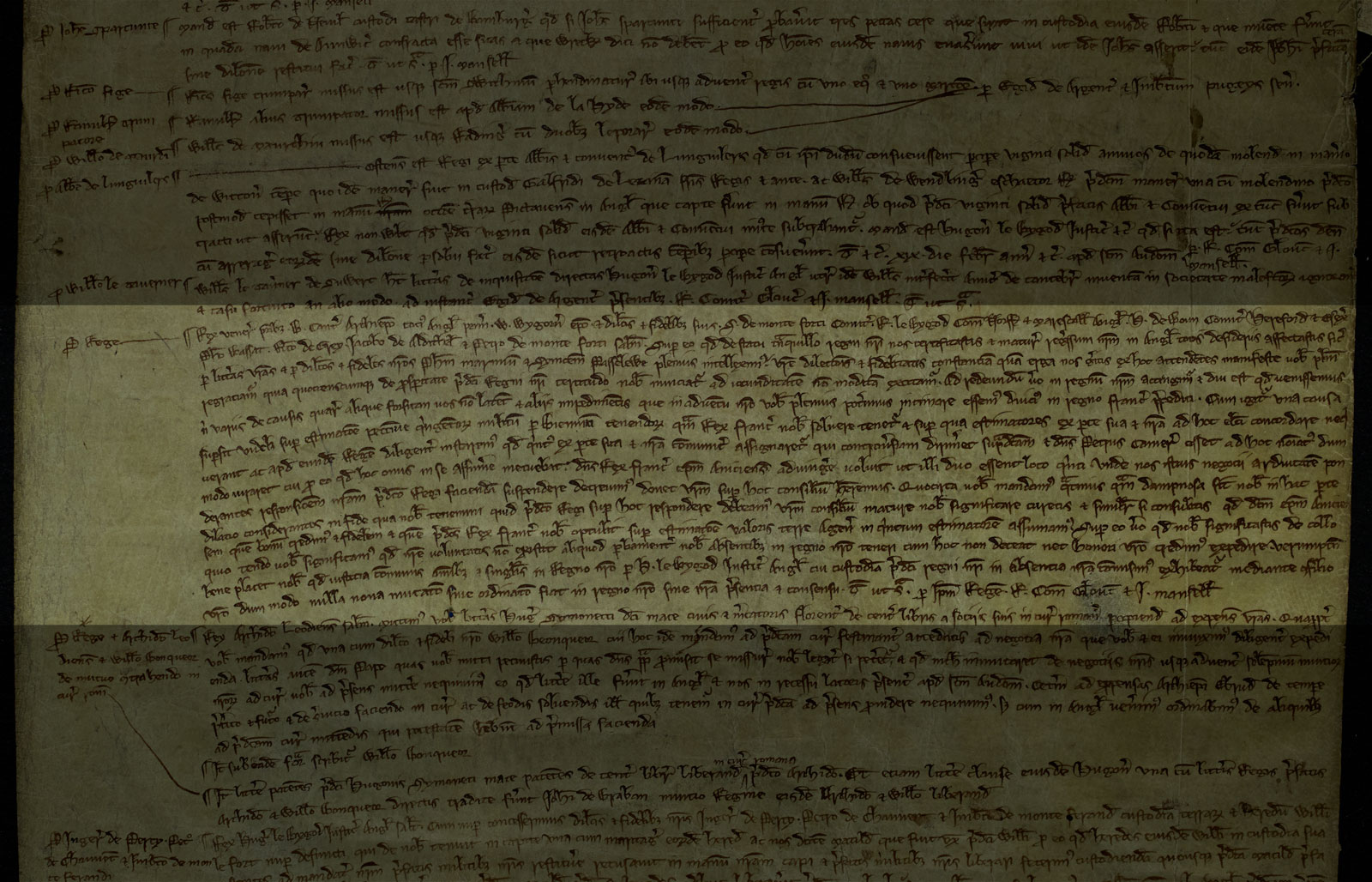
Letter from the king, who was at St Omer in France, ordering the archbishop of Canterbury and the government in England to prohibit any parliament being held in the absence of the king. The king also prohibited any further reforms in his absence. Dated 19 February 1260 (C 54/76).
Transcript
The king to the venerable fathers, Boniface, archbishop of Canterbury, primate of all England, and Walter, bishop of Worcester, and to his well-loved and faithful subjects, Earl Simon de Montfort, Roger Bigod, earl of Norfolk and marshall of England, Humphrey de Bohun, earl of Hereford and Essex, Philip Basset, Richard de Grey, James de Audley and Peter de Montfort, greeting.
We thank you very much for what you have told us about the peaceful state of our realm and your own eager desire for our speedy return to England, as we have learned from your letters and from our well-loved and faithful servants, Philip Marmion and Simon Passelawe, and we plainly understand from all this the constancy of your love and of the fealty which you bear towards us. Indeed, as often as we receive trustworthy report of the prosperity of our realm, we are moved to no small measure of joy. We are all prepared for returning home, and we would have been home long ago but for various causes, some of which, perhaps, are not unknown to you, and also other hindrances, of which we shall be able to tell you more when we return, all of which things have held us back longer in France. One cause still remains, – that is, the assessment of the money which the king of France is bound to pay us for maintaining 500 knights for two years, on which the assessors chosen on his behalf and ours have been unable to agree, so that we urgently begged King Louis that a fifth should be assigned commonly for both of us, to put an end to this deadlock, and that Peter the Chamberlain should be named for this, provided he would take the oath. But since he shrank from undertaking this responsibility alone, the king of France wished to join the bishop of Le Puy with him, that they two should act in place of a fifth assessor ; whereupon we, having in mind the difficulty of this matter, decided to withhold our reply to King Louis until we have your advice on it. Therefore we order you that, bearing in mind how much we are losing by delay in this matter, you should bestir yourselves, in the fealty in which you are bound to us, to let us know quickly your advice on what we ought to reply to King Louis. And at the same time, would you advise us to accept the bishop of Le Puy – whom the king of France has offered to us, and whom we believe to be good and trustworthy – as the fifth assessor in the assessment of the value of the Agenais?
And for what you wrote to us about holding parliament, we tell you that it is not our will that any parliament should be held in our realm while we are absent, since that would be unfitting, and we think it would not accord with our honour. It is our good pleasure that, without the help of your advice, common justice should be done to each and all in our realm by Hugh Bigod, justiciar of England, to whom we committed the custody of our realm during our absence, provided always that no new change or ordinance be made in our realm without our presence and consent.
Witness as above, 19 February in the year, etc., at St Omer, by the king himself, Richard, earl of Gloucester, and John Mansel.
Full transcript taken from RE Treharne and I.J Sanders (eds), Documents of the Baronial Movement of Reform and Rebellion, 1258-1267 (Oxford, 1973).
Simplified transcript
Letter from the king to the archbishop of Canterbury, 19 February 1260
The king sends greetings to the venerable fathers, Boniface, archbishop of Canterbury, primate of all England, and Walter, bishop of Worcester, and to his well-loved and faithful subjects, Earl Simon de Montfort, Roger Bigod, earl of Norfolk and marshall of England, Humphrey de Bohun, earl of Hereford and Essex, Philip Basset, Richard de Grey, James de Audley and Peter de Montfort.
In reply to what you wrote us about holding parliament, we tell you that it is not our will that any parliament should be held in our realm while we are absent, since that would be unfitting, and we think it would reduce our honour.
It is our desire that, without the help of your advice in parliament, common justice should be done to every person in our realm by Hugh Bigod, justiciar of England, to whom we committed the custody of our realm during our absence. We also order that no new ordinance or change to the law should be made in our realm without our presence and consent.
